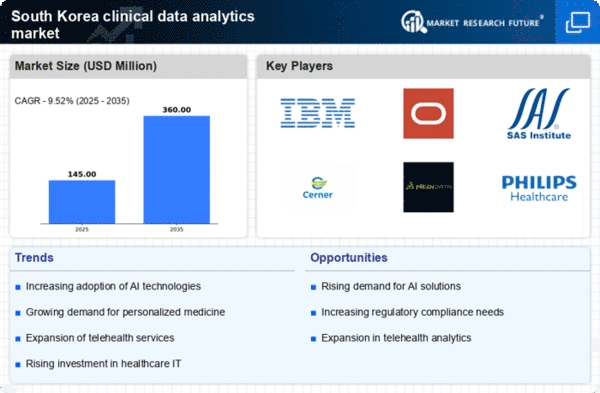Emergence of Telehealth Solutions
The emergence of telehealth solutions plays a pivotal role in shaping the clinical data-analytics market in South Korea. As telehealth becomes increasingly integrated into healthcare delivery, the volume of clinical data generated through remote consultations and monitoring rises significantly. This shift necessitates advanced analytics to interpret and utilize the data effectively. The market is projected to grow by approximately 12% annually as healthcare providers adopt telehealth platforms that incorporate data analytics capabilities. By analyzing telehealth data, organizations can gain insights into patient behavior, treatment efficacy, and resource allocation. This trend underscores the importance of data analytics in enhancing the effectiveness of telehealth services, thereby driving growth in the clinical data-analytics market.
Rising Demand for Data-Driven Insights
The clinical data-analytics market in South Korea experiences a notable surge in demand for data-driven insights. Healthcare providers increasingly seek to leverage data analytics to enhance patient outcomes and streamline operations. This trend is underscored by a projected growth rate of approximately 15% annually, driven by the need for evidence-based decision-making. As hospitals and clinics adopt advanced analytics tools, the focus shifts towards improving operational efficiency and patient care quality. The integration of analytics into clinical workflows allows for real-time monitoring and predictive modeling, which are essential for proactive healthcare management. Consequently, the clinical data-analytics market is poised for expansion as stakeholders recognize the value of data in optimizing healthcare delivery.
Increased Focus on Regulatory Compliance
The clinical data-analytics market in South Korea is influenced by an increased focus on regulatory compliance. Healthcare organizations are compelled to adhere to stringent regulations regarding data privacy and security, particularly with the implementation of the Personal Information Protection Act (PIPA). This regulatory landscape necessitates the adoption of advanced analytics solutions that ensure compliance while optimizing data usage. As organizations invest in technologies that facilitate compliance, the market is expected to grow, with an estimated increase of 10% in spending on compliance-related analytics tools. This trend highlights the importance of integrating compliance measures into data analytics strategies, thereby enhancing the overall integrity and trustworthiness of clinical data.
Advancements in Health Information Technology
Technological advancements in health information systems significantly impact the clinical data-analytics market in South Korea. The adoption of electronic health records (EHRs) and health information exchanges (HIEs) facilitates the collection and analysis of vast amounts of clinical data. This transition is supported by government initiatives aimed at digitizing healthcare infrastructure, which is expected to reach an investment of over $1 billion by 2026. Enhanced interoperability among systems allows for seamless data sharing, thereby improving the accuracy and efficiency of analytics. As healthcare organizations increasingly rely on sophisticated data analytics tools, the clinical data-analytics market is likely to witness substantial growth, driven by the need for comprehensive data integration and analysis.
Growing Investment in Research and Development
Investment in research and development (R&D) within the healthcare sector significantly propels the clinical data-analytics market in South Korea. Pharmaceutical companies and research institutions are increasingly allocating resources towards data analytics to drive innovation in drug development and clinical trials. This trend is reflected in the estimated $500 million investment in R&D analytics tools over the next five years. By harnessing the power of data analytics, organizations can identify trends, optimize trial designs, and improve patient recruitment strategies. The emphasis on R&D not only enhances the efficiency of clinical studies but also contributes to the overall growth of the clinical data-analytics market as stakeholders seek to leverage data for competitive advantage.
















